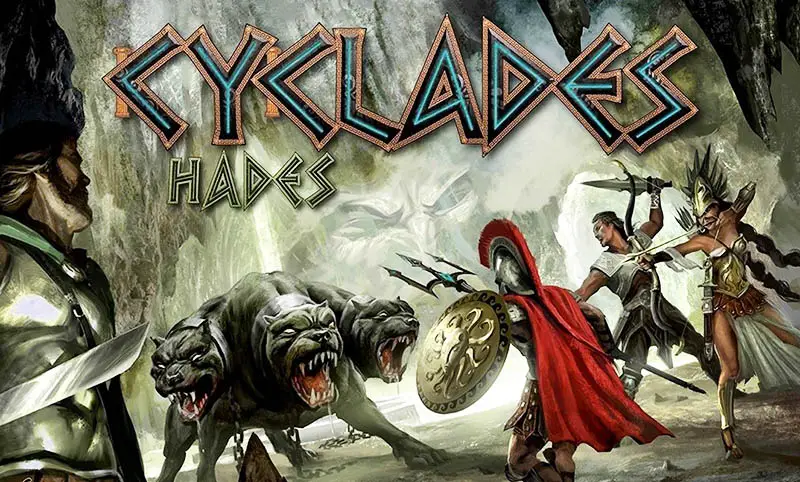
The Cyclades are currently at peace, but the sound of furious battles still echoes in our memories. Is this a long lasting peace or nothing but a short truce? There are whispers that Hades will soon return, bringing his undead phalanxes and ghost ships...
Every city-state will need to demonstrate their skills at recruiting powerful heroes and gaining the favor of all the gods of Olympus, even terrifying Hades, to extend its supremacy over his opponents...
Preliminary Notes:
The contents of this box cannot be played alone. You need to have the original Cyclades Game to enjoy them.
This box contains not one but several modules, which can be incorporated one by one into the basic game, according to the desires and experience level of the players (those modules are presented in the order we suggest you add them). Of course, the gods smile on those using all the modules and will make each adventure more legendary.
Components
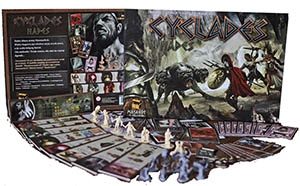
- 1 "Necropolis" building chip
- 4 "Theater" building chips
- 8 Prosperity Markers
- 1 Hades Tile (with a "Hades" side and a "Threat" side)
- 8 "Divine Favors" Tiles
- 5 "undead troops" figurines
- 5 "undead fleet" figurines
- 1 Hades column
- 6 hero figurines
- 1 "Cerberus" figurine
- 6 hero cards
- 10 magic items cards
- 5 mythological creatures cards
- 9 priestesses cards
- 1 rulebook
Module # 1: Free Positioning
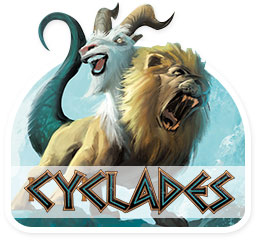
The implementation of this module requires only equipment available in the original game box.
Players follow the setup as stated in the basic rules, with the following modifications:
- They receive 7 Gold pieces (instead of 5)
- The board is left free of any military units
A preliminary round of betting will now be held to decide on which islands players are going to start the game.
The gods tiles (take one less than the number of players, as indicated in the original game's rules) are mixed and placed on the empty slots located above Apollo.
Positioning is done following the auction rule described in the basic rules, with one spe- cific constraint: during the preliminary round, there can be only one player on Apollo. Once the auction is ended, players pay their offerings, as planned.
They then chose the islands on which they will start the game, starting with the player who won the auction on the first God, and ending with one who took cover with Apollo (Coward!).
In turn, a player receives:
2 troops + 2 fleets + an additional bonus depending on the God whose auction he won:
- Poseidon: a fleet
- Ares: a troop
- Athena: a philosopher
- Zeus: a priest
- Apollo: a Prosperity Marker
Players must deploy their troops on at least two different islands. The player who bet on Ares may choose to start with a third island, or to place two troops on one island and one troop on the second island.
Similarly, they then spread their fleets on two different locations. Those locations must be adjacent to the islands where their troops are deployed. It is possible that the two fleets are placed on two different locations near the same island. The player who bet on Poseidon may choose to start with a third location, or to place two fleets on one location and one fleet on the second location.
Once a player has completed his deployment, he places his marker on the last available slot determining the order of play in the next round. The player who bet on the next God then deploys in the same fashion.
The real adventure can start now! The first mythological creature appears... But beware: the first round is a bit different because players will receive no income (but only for the first round)... Managing your bets to combine optimal placement and power is a critical first step on the long road to glory!
Special Rule: Two- Player Game
Each player plays with two Offering markers. 3 God tiles are placed in addition to Apollo. Once the auction is ended and paid, players are placed in the order of the pieces Offering. When a player removes his marker, he must immediately deploy: 1 fleet + 1 Troop + the bonus given by the God.
Module #2: Hades & His Undead

At the beginning of a round, place the Hades tile next to the game board with the "Threat" side up. Place the Hades column on the "0" slot.
At the beginning of each round, before the "2 - The Gods" phase, a player rolls two combat dice, and advances the column according to the total number indicated by the dice.
If the column reaches or passes the 9th slot, Hades will come into play and replace one of the other Gods!
Mix the gods tiles and place them in the usual manner. Then cover the tile of the active God placed just above Apollo, with the Hades tile showing its "Hades" side.
At the end of the round (that is, after the resolution of Apollo):
- All undead units are removed from the board.
- The Hades tile is placed back next to the board with its "Threat" side up, and the Hades column on the "0".
Hades and his minions are sent back to the realm of the dead ... But they can still wreak havoc during their next visit!
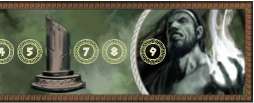
Example: The Hades column is on the 6 space. The two dice are rolled, resulting in a 1 and a 3.

The total is now higher than 9, so the Hades tile is turned over and activated.
Note: Generally, Hades will appear between 2 and 4 times per game).
Hades allows the player:
-
To Recruit Undead (troops And/or Fleets)

Hades offers a free undead.
It is possible to purchase extra undead, as follows:
- The second undead costs 1 GP
- The third one 2 GP
- The fourth one 3 GP
- The fifth one 4 GP
A player cannot purchase more than 4 extra undead in any given turn. But you can purchase a mix of troops and fleets. (For example, it is possible to recruit two fleets + 2 Troops for a total of 6 Gold)
-
To Build A Necropolis.
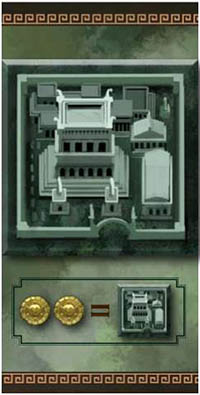
There can be only one Necropolis on the board.
This building must be built on an island controlled by the player and it fills a site usually reserved for a metropolis (Any other buildings already on this site are crushed, including a Metropolis).
Effect of building: For each regular military unit (That is to say living / not undead) eli- minated from the board, whether in battle, or by effect of a mythological creature, a Gold piece is placed on the Necropolis. During the next income phase, the player controlling the island where the Necropolis is located takes all the Gold pieces from the Necropolis.
Notes:
If a player takes possession of the island on which the Necropolis was built, he then controls it and he will take the Gold pieces during the next round.
When Hades comes into play later in the game, the player can build a new Necropolis: he then removes the Necropolis chip from its current position (leaving any Gold pieces on the island where they were placed) and places it on an island he controls.
-
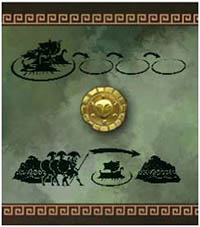
To Move Troops And / Or Fleets
The rules of movement and combat are exactly the same as for the movements associated with Poseidon and Ares.
There is only one additional requirement: At least one undead military unit must join each move, regular troops can join but are not mandatory!
During combat, if defeated, the player controlling Hades chooses the order in which he loses its military units (he may choose undead or regular units depending on his future plans).
Module # 3: Heroes And Creatures
Before the start of the game, shuffle the new heroes and mythological creatures cards with the ones from the original game to form a common deck.
The New Mythological Creatures

This expansion contains four new mythological creatures: Cerberus (with figurine), Charon, the Furies, and Empusa. In addition, there is a new card which replaces the Chiron from the base game. The effects of the cards are described on the summary sheet.
Heroes
They come into play and are recruited in the same way as the mythological creatures. When a hero is recruited, put his (or her) figurine on one of your islands, and keep the card in front of you. This hero will remain in play as long as he (or she) lives and you pay their maintenance costs.
At the beginning of each round, just after the income phase, you must pay 2 Gold pieces for each hero you want to keep. If you do not pay this amount, the hero disappears. Remove the figure from the board, and remove the corresponding card from the game (it does not go back on the discard pile).
Each Hero is worth a troop figurine in combat, but has two additional abilities:
-
A military power of its own. This power is active when the hero takes part in combat.
-
A special power, usually coming with its own conditions, if you decide to sacrifice the hero during your Action phase. Apply this power and remove the Hero's card from the game.
Important: you cannot sacrifice a hero during the turn he is recruited. You also cannot sacrifice a hero if you have selected Apollo.
Note that if a Hero is killed in battle he cannot be sacrificed just before his last breath.
The effects of the Hero cards are explained on the summary sheet.
Important :
Heroes are mixed in with the mythological creatures and are recruited in the same way. But be careful! They are not mythological creatures. Therefore:
- Temples do not provide a discount for the purchase of Heroes.
- You cannot discard a Hero card through the Special power of Zeus.
- There may be several Heroes on the same island. Heroes can be on the same island as a creature figurine.
Module #4 : Divine Favors
Gods Of Olympus To The Rescue
-
At the beginning of the game, make a pile with the Priestess cards on the side of the board.
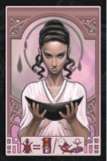
Effect Of Priestesses:
You can discard a priestess to avoid paying the cost of maintaining a Hero.
You can discard a priestess to not discard a creature figurine and benefit from its effect for another turn.
-
Shuffle the "Magic Items" cards and put them, face down, in a pile near the game board.
-
Shuffle the "Divine Favors" tiles and put them, face down, in a pile near the game board.
Divine Favors
Now players can enjoy certain benefits provided by new gods such as Hera, Hermes, or Aphrodite.
At the beginning of each turn, during the "2 - The Gods" phase:
If Hades comes into play (see module #2), re-shuffle all "Divine Favors" tiles (discarded or not) to form a new pile face down. ("Divine Favors" are not available when Hades is active)
Otherwise, draw the top tile of the "Divine Favors" pile and place it face-up next to the active God immediately above Apollo. The player whose offerings win the favor of this God will benefit both from the advantages of this God and from the Divine Favor placed next to that god.
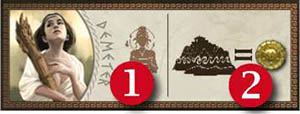
Each tile provides a Divine Favor bonus item (a Priestess or a Magic Item) 1 and a power usable once during this Action Phase 2.
At the end of the Action Phase, the Divine Favor tile is discarded (even if the player didn't use its power).
Magic Items
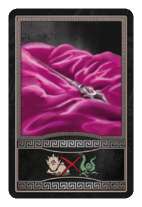
Magic Items are gained through some Divine Favor tiles.
They are kept face-up by the player who claimed them, and may be used in the turn they are obtained or in the following round.
Note: the Power of Hephaestus allows a player to acquire a Magic Item and keep it face down.
Magic Items are discarded after use.
The Divine Favors and Magic Items are described on the summary sheet.
Continue Reading

